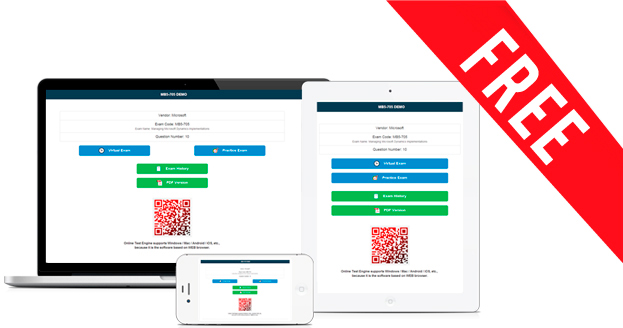免費一年的 PMHC 題庫更新
為你提供購買 Postpartum Support International PMHC 題庫產品一年免费更新,你可以获得你購買 PMHC 題庫产品的更新,无需支付任何费用。如果我們的 Postpartum Support International PMHC 考古題有任何更新版本,都會立即推送給客戶,方便考生擁有最新、最有效的 PMHC 題庫產品。
通過 Postpartum Support International PMHC 認證考試是不簡單的,選擇合適的考古題資料是你成功的第一步。因為好的題庫產品是你成功的保障,所以 Postpartum Support International PMHC 考古題就是好的保障。Postpartum Support International PMHC 考古題覆蓋了最新的考試指南,根據真實的 PMHC 考試真題編訂,確保每位考生順利通過 Postpartum Support International PMHC 考試。
優秀的資料不是只靠說出來的,更要經受得住大家的考驗。我們題庫資料根據 Postpartum Support International PMHC 考試的變化動態更新,能夠時刻保持題庫最新、最全、最具權威性。如果在 PMHC 考試過程中變題了,考生可以享受免費更新一年的 Postpartum Support International PMHC 考題服務,保障了考生的權利。

PMHC 題庫產品免費試用
我們為你提供通过 Postpartum Support International PMHC 認證的有效題庫,來贏得你的信任。實際操作勝于言論,所以我們不只是說,還要做,為考生提供 Postpartum Support International PMHC 試題免費試用版。你將可以得到免費的 PMHC 題庫DEMO,只需要點擊一下,而不用花一分錢。完整的 Postpartum Support International PMHC 題庫產品比試用DEMO擁有更多的功能,如果你對我們的試用版感到滿意,那么快去下載完整的 Postpartum Support International PMHC 題庫產品,它不會讓你失望。
雖然通過 Postpartum Support International PMHC 認證考試不是很容易,但是還是有很多通過的辦法。你可以選擇花大量的時間和精力來鞏固考試相關知識,但是 Sfyc-Ru 的資深專家在不斷的研究中,等到了成功通過 Postpartum Support International PMHC 認證考試的方案,他們的研究成果不但能順利通過PMHC考試,還能節省了時間和金錢。所有的免費試用產品都是方便客戶很好體驗我們題庫的真實性,你會發現 Postpartum Support International PMHC 題庫資料是真實可靠的。
安全具有保證的 PMHC 題庫資料
在談到 PMHC 最新考古題,很難忽視的是可靠性。我們是一個為考生提供準確的考試材料的專業網站,擁有多年的培訓經驗,Postpartum Support International PMHC 題庫資料是個值得信賴的產品,我們的IT精英團隊不斷為廣大考生提供最新版的 Postpartum Support International PMHC 認證考試培訓資料,我們的工作人員作出了巨大努力,以確保考生在 PMHC 考試中總是取得好成績,可以肯定的是,Postpartum Support International PMHC 學習指南是為你提供最實際的認證考試資料,值得信賴。
Postpartum Support International PMHC 培訓資料將是你成就輝煌的第一步,有了它,你一定會通過眾多人都覺得艱難無比的 Postpartum Support International PMHC 考試。獲得了 PSI-PMHC 認證,你就可以在你人生中點亮你的心燈,開始你新的旅程,展翅翱翔,成就輝煌人生。
選擇使用 Postpartum Support International PMHC 考古題產品,離你的夢想更近了一步。我們為你提供的 Postpartum Support International PMHC 題庫資料不僅能幫你鞏固你的專業知識,而且還能保證讓你一次通過 PMHC 考試。
購買後,立即下載 PMHC 題庫 (Perinatal Mental Health Certification): 成功付款後, 我們的體統將自動通過電子郵箱將您已購買的產品發送到您的郵箱。(如果在12小時內未收到,請聯繫我們,注意:不要忘記檢查您的垃圾郵件。)
最新的 PSI-PMHC PMHC 免費考試真題:
1. 103. Electroconvulsive Therapy (ECT) during pregnancy:
A) is less risky than taking medication.
B) has no associated risks.
C) should not be considered as a treatment option.
D) is considered to be relatively safe.
2. 20. Removal of the child from the home is a common response to PPD diagnosis.
A) True
B) False
3. 47. Which of the following statements about the impact of stillbirth is supported by the research literature?
A) Complicated grief is not observed among parents following stillbirth.
B) There has been no demonstrated effect of stillbirth on older, surviving siblings within the family
C) Stillbirth is associated with increased psychological distress in a subsequent pregnancy
D) Attending a support group has no effect on symptoms of psychological distress following a stillbirth.
4. 92. "Postpartum Blues" is distinguished from postpartum depression by severity, duration, and which of the following?
A) Timing
B) History
C) Support
D) Environment
5. 38. When working with parents who have some form of sensory impairment, nurses should consider which information when writing a plan of care?
A) One of the major difficulties visually impaired parents experience is the skepticism of health care professionals
B) Childbirth education and other materials are available in Braille.
C) Technologic advances, including the Internet, can provide deaf parents with a full range of parenting activities and information
D) Visually impaired mothers cannot overcome the infant's need for eye-to-eye contact
E) The best approach for the nurse is to assess the parents' capabilities rather than focusing on their disabilities
問題與答案:
| 問題 #1 答案: A | 問題 #2 答案: B | 問題 #3 答案: C | 問題 #4 答案: A | 問題 #5 答案: A,B,C,E |




 1169位客戶反饋
1169位客戶反饋













1.160.124.* -
為了準備我的PMHC考試,我學習了你們的考古題,這是一個非常不錯的考試準備指南,我輕松的通過了考試。